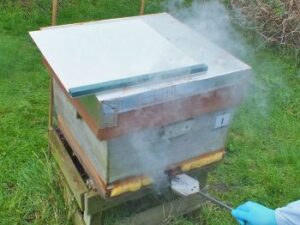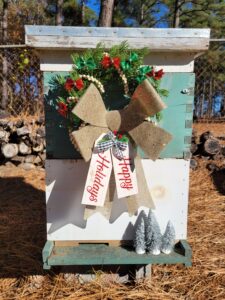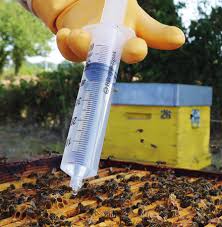What Should I Be Doing in My Apiary This Month? December
go.ncsu.edu/readext?1042768
en Español / em Português
El inglés es el idioma de control de esta página. En la medida en que haya algún conflicto entre la traducción al inglés y la traducción, el inglés prevalece.
Al hacer clic en el enlace de traducción se activa un servicio de traducción gratuito para convertir la página al español. Al igual que con cualquier traducción por Internet, la conversión no es sensible al contexto y puede que no traduzca el texto en su significado original. NC State Extension no garantiza la exactitud del texto traducido. Por favor, tenga en cuenta que algunas aplicaciones y/o servicios pueden no funcionar como se espera cuando se traducen.
Português
Inglês é o idioma de controle desta página. Na medida que haja algum conflito entre o texto original em Inglês e a tradução, o Inglês prevalece.
Ao clicar no link de tradução, um serviço gratuito de tradução será ativado para converter a página para o Português. Como em qualquer tradução pela internet, a conversão não é sensivel ao contexto e pode não ocorrer a tradução para o significado orginal. O serviço de Extensão da Carolina do Norte (NC State Extension) não garante a exatidão do texto traduzido. Por favor, observe que algumas funções ou serviços podem não funcionar como esperado após a tradução.
English
English is the controlling language of this page. To the extent there is any conflict between the English text and the translation, English controls.
Clicking on the translation link activates a free translation service to convert the page to Spanish. As with any Internet translation, the conversion is not context-sensitive and may not translate the text to its original meaning. NC State Extension does not guarantee the accuracy of the translated text. Please note that some applications and/or services may not function as expected when translated.
Collapse ▲December may not be the best month for doing bee work, but this doesn’t mean you get to take the whole month off as there are still plenty of activities to fill the time. Varroa mites don’t just disappear because winter is here. Cold weather, however, does mean the queen will stop laying, and this makes a perfect time to perform an oxalic acid (OA) treatment to keep the mite levels very low.
Some beekeepers do multiple OA treatments throughout the year using the registered product ApiBioxal, but studies have shown that this is ineffective since the mites under the cappings are not affected. Although there is rarely a time when there is zero brood in North Carolina, late November and early December is the best chance to be broodless. At this point, a one-time application of oxalic acid – either vaporization or dribble method – is very effective as a winter clean up to get rid of any remaining Varroa mites. Ideally this allows the bees to remain mite-free and healthy all the way into spring.

A honey bee hive being treated with oxalic acid via sublimation. The oxalic acid vapour is normally confined to the inside of the hive but is shown here for illustration. (Credit Betterbee)
The winter months are a great time to research beekeeping topics and learn about new methods or techniques. Beekeepers can advance their knowledge through county bee schools and online classes. Just because you already took the beginner’s class prior to your beekeeping endeavors, it doesn’t mean you won’t learn something new by taking it again. After a season or two of beekeeping experience, these classes may be even more useful than they were when first starting out. As an experienced beekeeper, you will now have a better understanding of the discussion and hopefully you can use some of that knowledge to help explain the ‘why’ and not just the ‘how to’. The North Carolina State Beekeepers Association website provides a list of many of the counties that offer classes so check to see if there is one near you. Other places to search for beekeeping classes are with your local NCDA Extension office or the NC State Apiculture website.
While you are waiting for the new classes to start up, take this time to finish up your preparations for the holiday season. If you are a last-minute shopper or have someone on the list that is hard to shop for, be creative and make some cute, bee-related gifts to have on hand for the gift giving season. Jars of honey, soaps, candles, and gift baskets can all be prepared from the resources you collected over the summer. Don’t let the hard work of the bees go to waste! Hand-crafted gifts are always well received.
Finally, plan for the upcoming season. As always with beekeeping, planning is important, and the winter is a good time to plan for next season before things get too busy in the apiary. Hopefully you have already done an inventory of the equipment  you have and what you will need. Go ahead and place your orders now for beekeeping equipment and start getting everything ready. Put new boxes together and start making the frames you will need for next season. If you wait until you need it, there is a chance these items will be out of stock and then it may be too late by the time you get it. It is much easier to have things ready before spring flowers start blooming. Writing down your goals may help with a clear direction for next season and deciding each of the steps that need to be completed may help successfully reach those goals.
you have and what you will need. Go ahead and place your orders now for beekeeping equipment and start getting everything ready. Put new boxes together and start making the frames you will need for next season. If you wait until you need it, there is a chance these items will be out of stock and then it may be too late by the time you get it. It is much easier to have things ready before spring flowers start blooming. Writing down your goals may help with a clear direction for next season and deciding each of the steps that need to be completed may help successfully reach those goals.



